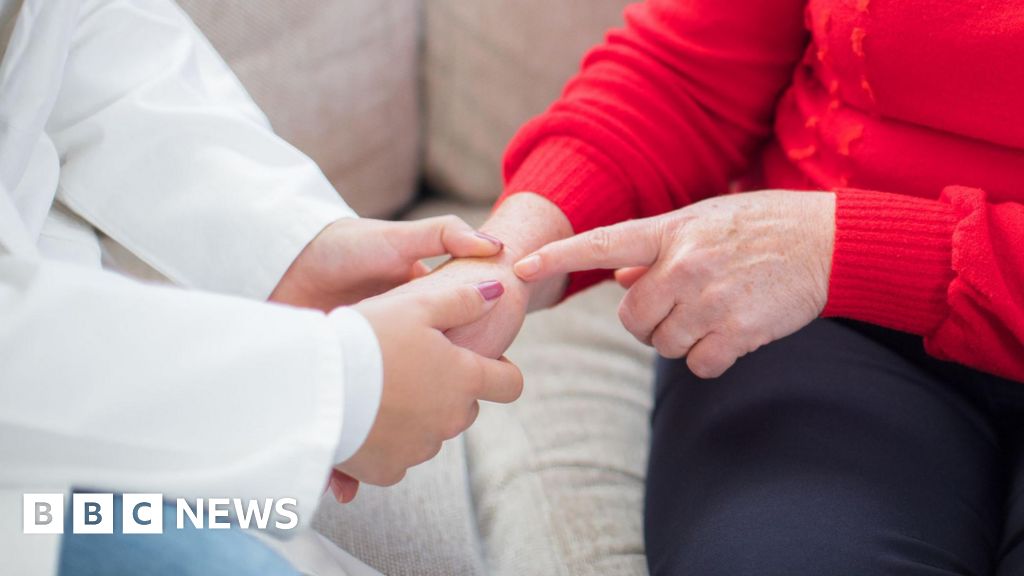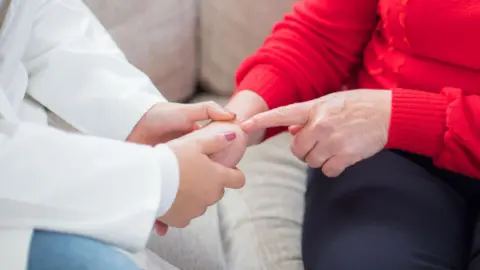
Parkinson’s blood-test hope for treatment research
- Health
- June 18, 2024
- No Comment
- 129
By Philippa Roxby, Health reporter, BBC News
 Getty Images
Getty ImagesA simple blood test using artificial intelligence to predict Parkinson’s disease years before symptoms begin has been developed by researchers.
They hope it can lead to a cheap, finger-prick test providing early diagnoses – and help find treatments to slow down the disease.
Charity Parkinson’s UK said it was “a major step forward” in the search for a non-invasive patient-friendly test.
But larger trials are needed to prove its accuracy.
Parkinson’s affects nearly 10 million people worldwide and more than 150,000 in the UK.
Many are diagnosed having developed symptoms, such as tremors, movement and memory problems – caused by nerve cells dying in the part of the brain that controls movement.
There is no cure, and no treatment to slow or stop the disease, although therapies exist to help manage symptoms.
Correctly predicted
The researchers, led by scientists at University College London and University Medical Center Goettingen, in Germany, took blood samples from a group of people with Parkinson’s and another without, to identify eight major proteins most likely to predict who would develop the condition.
They then tested blood from 72 patients at risk of brain disorders such as Parkinson’s for those eight protein markers – and followed them up over 10 years.
Using the AI tool, they correctly predicted 16 would develop Parkinson’s – up to seven years before symptoms began.
In total, the test predicted 79% would develop the disease – and the researchers are still following up other patients to confirm its accuracy.
‘Stable door’
The markers were directly linked to inflammation and degradation of proteins and could be used to develop new drug treatments for Parkinson’s, they said.
“At present we are shutting the stable door after the horse has bolted,” senior author Prof Kevin Mills, from UCL’s Great Ormond Street Institute of Child Health, said.
“We need to start experimental treatments before patients develop symptoms.”
Co-author Dr Jenny Hällqvist, from UCL, said: “People are diagnosed when neurons are already lost.
“We need to protect those neurons, not wait till they are gone.”
Parkinson’s symptoms are usually mild at first and develop gradually.
The main symptoms then affect movement and include:
- shaking, which usually starts in the hand or arm
- slow movement, such as walking with very small steps
- stiffness and tension in the muscles, which can make it difficult to move around or make facial expressions
In the brain, nerve cells lose the ability to produce an important chemical called dopamine, linked to movement, because of the build-up of a protein called alpha-synuclein.
NHS – Parkinson’s disease
The researchers now plan to create a simpler test, where a drop of blood on a card can be posted to the lab, to see if it can predict Parkinson’s even earlier.
Prof David Dexter, research director at Parkinson’s UK, which helped fund the study, said: “The findings add to an exciting flurry of recent activity towards finding a simple way to test for and measure Parkinson’s.”
The test may be able to tell the difference between Parkinson’s and other similar conditions, he added.
Prof Ray Chaudhuri, professor of movement disorders and neurology, at King’s College Hospital and King’s College London, said blood tests for Parkinson’s diagnosis and prediction were “a massive unmet need” – but questioned whether the move was ethical given there was no cure.
Prof Michele Vendruscolo, professor of biophysics, at the University of Cambridge, said the test could be performed with equipment already in major hospitals and help recruit people at risk of the disease for clinical trials.
“They could be used to monitor the efficacy of experimental therapeutics,” he said.
The research is published in Nature Communications.
#Parkinsons #bloodtest #hope #treatment #research










